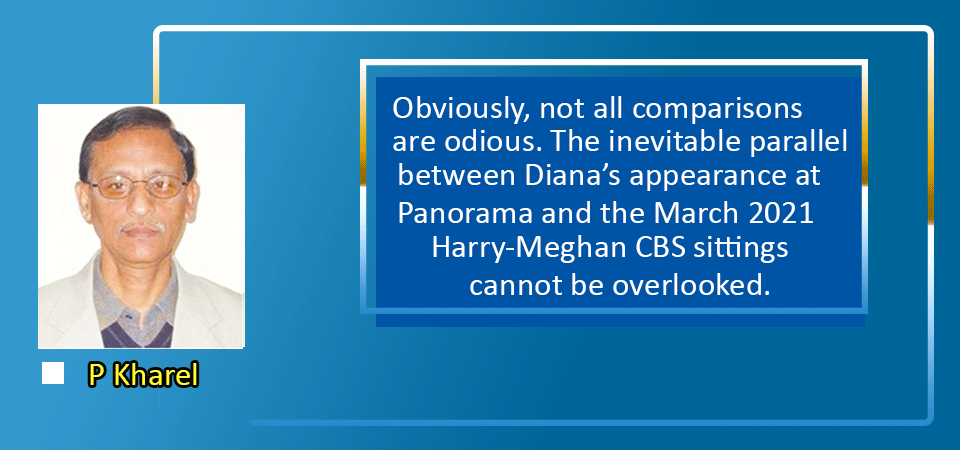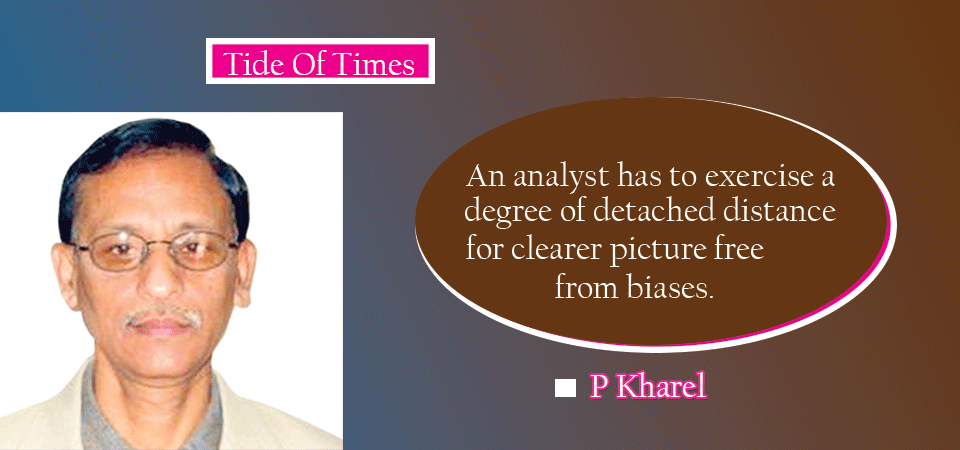Battle Not So Royale

P Kharel
Whenever BBC World News bulletins mention “the Queen”, the rest of the world, too, is expected to decode the reference to the Britain’s Queen Elizabeth II. But the state protected broadcasting service every now and then incurs the displeasure of Buckingham Palace and prime minister’s official residence at London’s 10 Downing Street.
British royalty generates mixed reactions. Some people mock at and revile monarchy as a useless, archaic institution living off tax payers’ hard-earned money whereas the former empire’s majority of people admire and heartily hail it as a national treasure. News media depute special correspondents and consultants to investigate and forage for anything to do with the royal family for juicy, lurid details.
In a stinging rebuff, the Prince of Wales Charles’s son Harry and his wife Meghan Markel recently joined an American chat show on the broadcaster CBS. Speculated as bombshell days before being aired on March 7, the royal encounter with prominent TV personality Oprah Winfrey contained bits of information, including the interviewee couple’s description and claim of the difficulty faced at the Firm.
Colour of treatment
Meghan, who would have been emphatically described as coloured during the earlier decades, gave more than a hint of racism she was subjected to in the palace circle. Buckingham Palace expressed shock over the treatment it learnt Meghan suffered and pledged to investigate.
Once bitten, twice shy, as the saying goes. In 1995, BBC’s Panorama carried Harry’s mother Diana’s power-packed interview bombshell, in which she admitted having had extra-marital affairs. Two years later when she died in a controversial car crash in Paris, the Queen and the Prince of Wales were widely criticised for being too cool, aloof and slow to react in appropriate sympathy.
Before the Harry-Meghan interviews went on air, a Buckingham Palace statement read: “The Duke and Duchess are no longer working members of the Royal Family and therefore any decisions they take with regard to media commitments are matters for them.”
Obviously, not all comparisons are odious. The inevitable parallel between Diana’s appearance at Panorama and the March 2021 Harry-Meghan CBS sittings cannot be overlooked. They were unhappy with their palace experiences, and chose to go public with tales of woes.
Diana’s urge to become people’s princess is not without a pinch of venom to cast royalty in unflattering light, given the manner she haggled to retain the royal title. As a compromise “Diana, the Princess” was agreed upon. Harry finalised Megxit in 2020 during a meeting with the Queen, Prince Charles and William.
As for racism in Britain, the interview carried no big revelation. A 2016 study showed 43 per cent of Britons believing the empire was a good thing, and 44 per cent termed their country’s colonial past a source of pride. A 2020 study reinforced the indication, emphasising Britons to be more eager than people in Japan, France and Germany, among other former colonial powers, to have an empire.
Diana’s death in Paris in 1997 was spaced by five days with Mother Teresa’s death but the princess’s end drew disproportionately larger press coverage and intense popular attention for weeks. It nearly eclipsed the otherwise highly regarded nun’s demise. With the passage of time, Mother Teresa’s service to the poor and downtrodden regained a lasting strength in public memory span with rich tributes.
Such are the strange ways how public personalities figure in the press that dishes out what it thinks the public should know. In show business, news holes and prime time broadcast slots, yesteryears’ celebrities also find space aplenty, provided they are prepared to tell juicy, racy tales and carry ample ammunitions aimed at big shots—the bigger the better, and the more the merrier. Gory story sells in tabloid journalism pandering to a latent aspect of public taste.
Celebrities circulating with fictionalised public profile whip up chronic curiosity. Image off screen and stage is carefully created, manicured, preserved and promoted for maximum mileage. Publicity and sponsorships are accrued in ample quantities, often for ages.
Sussex, chose CBS and not a British channel to share their side of the story probably signaling their plan to settle, sell and score in the land of opportunities, and show off the success to the British Meghan joined by virtue of marriage to Prince Harry. The pale community, too, like Meghan, as she is one of their own and she has come to America with her royal husband.
Although bra burning had begun in real earnest into the 1970s, gender sensitisation had not progressed swiftly in Britain. Royal marriage with a divorcee was not appreciated, and virginity was looked forward to with rigidity for respect and warmth. In 1981, Diana’s uncle Lord Fermoy made a public statement: “Yes, she is a virgin...she has never had a lover.”
Urge to avenge
Divorced in 1996, Diana was deeply engaged in avenging her pride. Commentators said, she would have done anything to damage British royalty, though she haggled for retaining her royal title. Hence the compromise—Diana, the Princess—by the time the divorced finally went through. Charles married his long time heart throb Camilla Shands, an American divorcee, and has not strayed to public knowledge.
Diana insisted on the title for social mobility and the attendant aura and attention a royal title ensured. At the time of her fatal accident, she is believed to have been pregnant with the Egyptian Muslim Dodi Fayed’s child. That could be the reason she feared being killed by the British establishment. Observers estimate as many as 175 theories regarding the cause that led to the fatal incident in Paris.
Dirty laundry washing in public contributed to gradual decline in royalty’s popularity. Of the 25,488 people who responded to a poll, an overwhelming 92 per cent voted for stripping Meghan and Harry of their royal titles. Seven per cent opposed the suggestion whereas only one per cent remained undecided.
A group named Republic campaigns vigorously for abolishing monarchy altogether. One of its campaigners, Graham Smith spoke of the problem: “We have a monarch who isn’t prepared to do anything at all of any importance because that would jeopardise her position. As far as a monarch is concerned, she has to stay out of it and have no role in it.” As for the rest of the world, the issue attracts as much attention or indifference as Britons do when it comes to similar issues originating elsewhere in the world.
(Professor Kharel specialises in political communication.)
Recent News

Do not make expressions casting dout on election: EC
14 Apr, 2022
CM Bhatta says may New Year 2079 BS inspire positive thinking
14 Apr, 2022
Three new cases, 44 recoveries in 24 hours
14 Apr, 2022
689 climbers of 84 teams so far acquire permits for climbing various peaks this spring season
14 Apr, 2022
How the rising cost of living crisis is impacting Nepal
14 Apr, 2022
US military confirms an interstellar meteor collided with Earth
14 Apr, 2022
Valneva Covid vaccine approved for use in UK
14 Apr, 2022
Chair Prachanda highlights need of unity among Maoist, Communist forces
14 Apr, 2022
Ranbir Kapoor and Alia Bhatt: Bollywood toasts star couple on wedding
14 Apr, 2022
President Bhandari confers decorations (Photo Feature)
14 Apr, 2022



